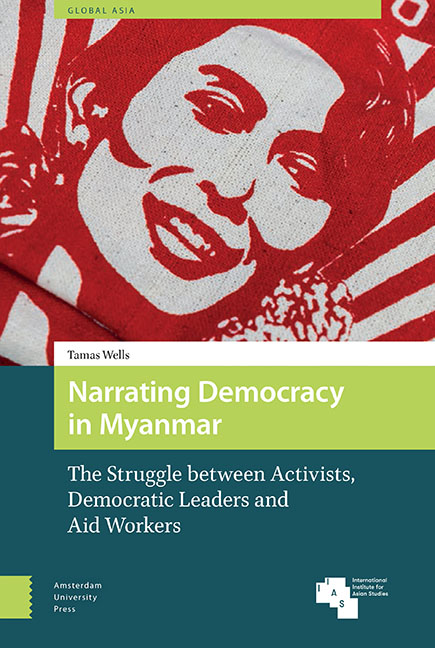Book contents
- Frontmatter
- Contents
- Abbreviations
- Acknowledgements
- Foreword
- 1 Introduction
- 2 Elucidating the Meaning of Democracy through Narrative
- 3 Toward the ‘Ocean of Democracy’?: The British Colonial Administration, the Thakin and Contests over Meanings of Democracy in late Colonial Burma
- 4 Burma after Independence: From Moral to ‘Disciplined’ Democracy
- 5 A liberal Narrative
- 6 A benevolence Narrative
- 7 An Equality Narrative
- 8 Exposing the Political use of Narratives
- 9 Beyond an ‘Ideal type’
- 10 Playing Different Games: Myanmar’s Future Challenges
- Index
6 - A benevolence Narrative
Published online by Cambridge University Press: 17 June 2021
- Frontmatter
- Contents
- Abbreviations
- Acknowledgements
- Foreword
- 1 Introduction
- 2 Elucidating the Meaning of Democracy through Narrative
- 3 Toward the ‘Ocean of Democracy’?: The British Colonial Administration, the Thakin and Contests over Meanings of Democracy in late Colonial Burma
- 4 Burma after Independence: From Moral to ‘Disciplined’ Democracy
- 5 A liberal Narrative
- 6 A benevolence Narrative
- 7 An Equality Narrative
- 8 Exposing the Political use of Narratives
- 9 Beyond an ‘Ideal type’
- 10 Playing Different Games: Myanmar’s Future Challenges
- Index
Summary
Abstract
This chapter describes an alternate narrative of democracy that centres around the value of sedana or benevolence. This narrative has three parts: the challenge of dictatorial leadership in Myanmar and the moral failure of citizens; the vision of a morally transformed society based on benevolent leadership and the values of unity and obligation; and a strategy of moral education to renew these values within society and promote discipline. This narrative highlights a moral rather than liberal vision – one in which the ability of individual political actors to transcend self-interest is of the highest importance. Proponents of this narrative emphasise that a focus on the narrow interests of particular individuals or groups will spark division and thereby undermine democracy – with the most immoral approach to politics being that of the ar nar shin (‘power-obsessed dictator’).
Keywords: National League for Democracy, Aung San Suu Kyi, benevolence, moral, unity, discipline
In September 2019, Aung San Suu Kyi gave a speech for International Democracy Day in the nation's capital, Naypyidaw. In the previous year she had been stripped of multiple international awards for supporting human rights and democracy – as criticism of her and the NLD reached a crescendo following the crisis in Rakhine State. In the speech, Aung San Suu Kyi (2019) defines democracy as ‘people power’. Yet she stresses that this people power can be used both positively and negatively – it can be used for parahita (‘public interest’) or atta hita (‘self-interest’). ‘Some people think that democracy is just for self-gain’, Aung San Suu Kyi (ibid.) said, ‘basically, human beings are selfish. We can't ignore this fact, if we want a successful system. I would say democracy is a culture, rather than a system as it involves not only politics, but also social, economic and philosophical values.’ The key to these values of democracy, as opposed to a ‘system’, was ‘goodwill’. Aung San Suu Kyi (ibid.) concluded by saying that Myanmar must ‘realize democratic culture through true goodwill towards the country and mankind for the flourishing of democracy’.
- Type
- Chapter
- Information
- Narrating Democracy in MyanmarThe Struggle Between Activists, Democratic Leaders and Aid Workers, pp. 119 - 146Publisher: Amsterdam University PressPrint publication year: 2021



